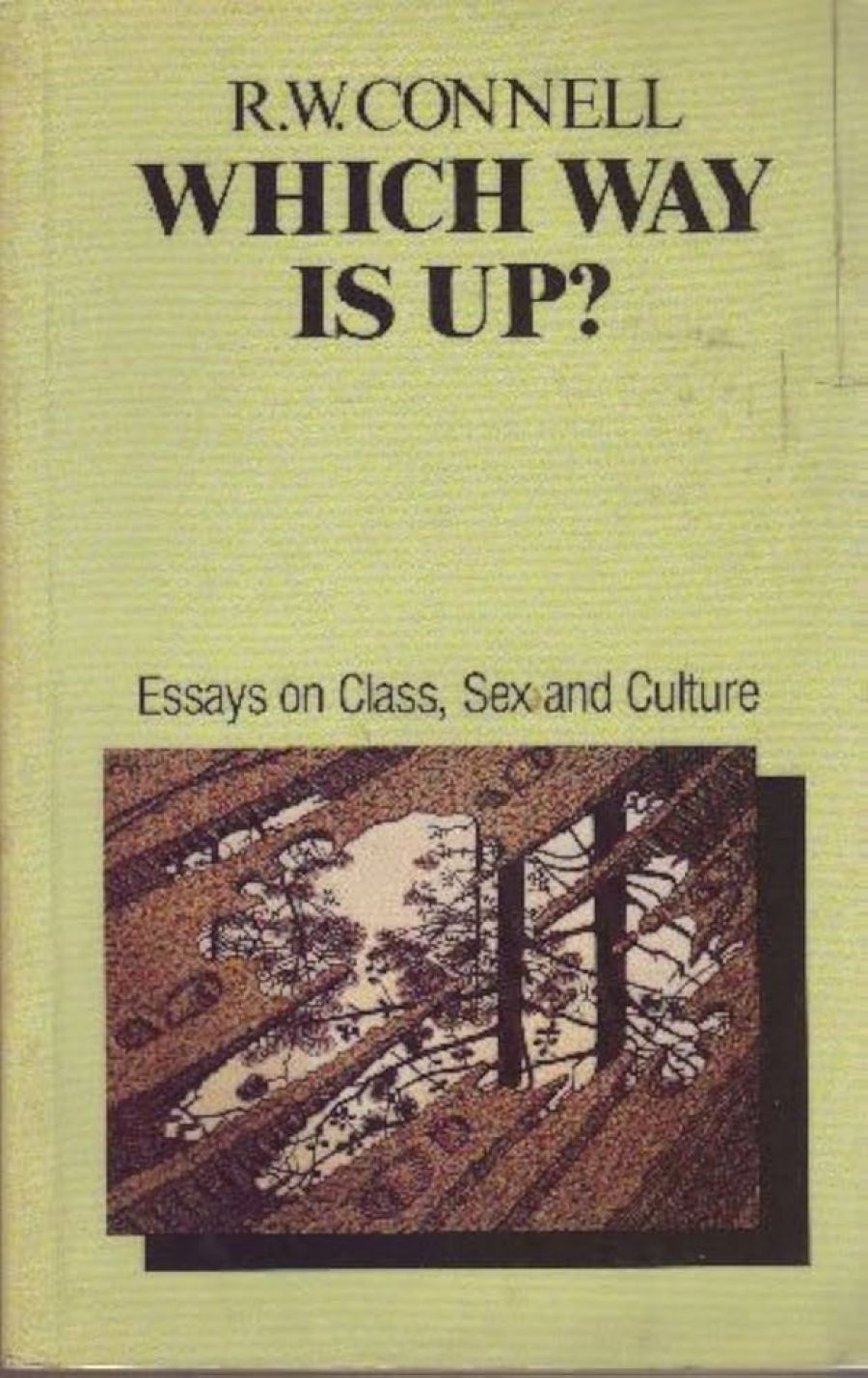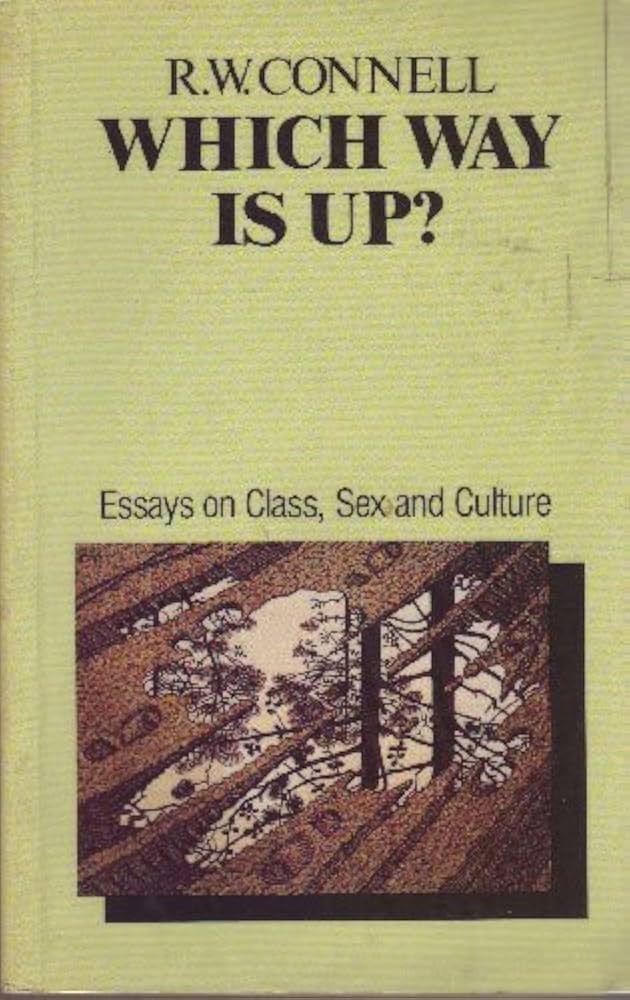
- Free Article: No
- Contents Category: Culture
- Review Article: Yes
- Article Title: Marxism for Mensa
- Online Only: No
- Custom Highlight Text:
R.W. Connell is unquestionably the most intellectually ambitious Australian socialist. To call him a prodigious synthesiser is an insult, yet his mind is hospitable to an amazing variety of theoretical influences and thoroughly digested bodies of empirical data. Since his seminal essay ‘Images of Australia’(l968) he has set out to upgrade radically Australian sociology. While his assumptions are often contested, and his achievements are sometimes regarded as trite or tautologous, there is no doubt that he has originated the most consistent and theoretically sophisticated analysis of Australian society.
- Book 1 Title: Which Way is Up?
- Book 1 Subtitle: Essays on class, sex, and culture
- Book 1 Biblio: George Allen Unwin, $9.95 pb
- Book 1 Cover Small (400 x 600):

- Book 1 Cover (800 x 1200):

Connell is also prolific. No doubt these essays were composed between more sustained research operations, often collaborative, for which he is becoming well-known. In no sense, however, are these essays the product of a mind in repose. They are not homely, empirical or occasional; they are difficult theoretical exercises, summaries and rebuttals of often more difficult bodies of theory.
The very existence of this book draws attention to Connell’s mind and personality, his theoretical vision. As the publisher’s blurb affirms, this is a ‘picture of an intellectual at work’. Yet this immensely powerful mind disclaims a systematic point of view. The essays ‘do not grow from a single starting-point or from a well-defined system’, Connell says. The book is, however, ‘theory-making in process’. In his hands, major theoretical issues and approaches to their solution tend to shatter the boundaries of the conventional essay form.
The subject of the collection would appear to be Connell’s response to major ideological and theoretical developments within the leftist intellegentsia in the second half of the 1970s. He brings to this experience a personal rationalism and a Free University pedagogy which somehow survived the decline of 1960s radicalism. It should be pointed out that not a single essay addresses intellectual movements like neo-liberalism and neo-conservatism, movements outside his particular leftist sub-culture.
The major problems addressed here are as follows: feminism and theories of patriarchy; an obscure essay which can only be described as masculine protest against certain feminist habits of mind; theories of ‘social reproduction’; structuralist Marxism, especially the work of Althusser and his followers; the study of popular culture and adolescence; the nature of the international class structure; and the logic of class analysis, which for Connell is sociology.
To these are added a scholarly analysis of sociological factors in Bach’s musical career, a noble but inconclusive defence of Doctor Freud, and an interesting restatement of the usefulness of Sartre's philosophical and sociological writings.
Aesthetic and literary references abound. One essay, we are told, was revised to the accompaniment of Wagner and Sibelius. A good deal of poetry is quoted. There seems no limit to Connell’s intellectual range. His exceptionally fine education makes his prose extremely clear, especially for a theorist. Amongst Australian sociologists, only John Carroll displays a comparable erudition. Connell is as shy and earnest as Carroll is mordant and flamboyant. Perhaps a little more disciplined flamboyance would have made this a more accessible book.
Connell says the book’s title is not facetious, but it is not very helpful either. Thirteen essays are organised into three Parts. The Parts are untitled, and their sequence appears to me to be sex, class, then culture, not the order given in the subtitle. Within each part, the essays are printed in chronological order of first appearance or composition. The sequence of the book as a whole is not chronological. Worse, Connell suggests we need not read the essays in the printed order. This suggestion makes the reader’s task more difficult than necessary, and seems to betray a false humility. Why produce an L.P. if you only have a collection of old 45s?
To gather the essays in one volume strongly suggests an internal, biographical progress. Short prefaces before each essay reinforce this impression. Yet internal development is not easily discerned or spelled out. Full appreciation of the mastery and mystery in these essays requires formidable foreknowledge of abstruse leftist texts. Many readers have had other things to do or read than Althusser, Poulantzas or Bourdieu over the last five to ten years. The closest approximation to a general contextual essay for this collection is the last one, ‘Intellectuals and Intellectual Work’. A clear autobiographical opening chapter would have helped to focus this collection more effectively than the brief, coy prefaces.
There is too much intellectual continuity through these essays, too much repetition at high levels of abstraction, for them to be read as unrelated pieces. One of the book's charms is its continuity with Connell’s earlier, still-scattered essays. It is delightful to see 1960s theoretical weapons being turned against the gurus of the left in the 1970s. Only one essay attacks mainstream, professional sociology with unreconstructed New Left gusto – the extremely aggressive ‘The concept of role and what to do with it’.
This essay on role-theory is numbingly clever, an exaggerated rejection of a metaphor of limited but considerable value – theatricality in everyday life – that was rigorously employed by Erving Goff- man, its best exponent, in his books on face-to-face interaction. Connell does refer to the ‘aptness’ of the metaphor in modem society, but passes on to a too conspiratorial analysis of the popularity of role-theory.
The role-theory essay is unusually destructive, but even the finest essays in the book, such as the brilliant critique of the Althusserian approach to class, contain a kind of intellectual imbalance, an almost sectarian caging of the mind. The unique quality of Connell’s choice of theoretical targets, and his handling of them, is an almost aristocratic rationalism; he is never hysterical or paranoid.
The danger is that Connell’s great gifts will remain uncommunicated, except to those in small leftist circles. His priorities appear to be affected by a solemn collectivism, an exclusive attachment to ‘the Left’ and the phenomenological world of the left. While he expends enormous energy correcting the false consciousness of otherwise ‘good lefties’, Connell’s most basic beliefs are either simplified or unexplained.
For instance, Connell states a number of times that ‘capitalism and patriarchy are the two main forms of oppression in human history’. To ask a typical Connell question, why only two elements in a theory of oppression? An almost systematic neglect of racial and ethnic domination is one of many puzzling omissions in Connell’s analysis of modernity. There is a fugitive reference to ‘more horrific forms of oppression, such as fascism’, but no detailed attention is paid to fascism or Stalinism or the theoretical problem of the ‘socialist bloc’.
Connell attributes extraordinary dimensions to capitalism as a world system, despite his own methodological strictures against ‘theoretical centralism’ amongst other sins. Bureaucratic dictatorship and fascism, he says at one point, ‘have grown out of capitalism’. Each exaggerates ‘one side of [the] amalgam tortuous calculation on one side, and on the other, atrocity as a way of life’. He continues: ‘Stalin and Hitler, Pol Pot and Pinochet, are authentic products of a capitalist world system. If that sounds odd. bear in mind that its “moderate” political forms, the liberal democracies, have also been capable of the bombings of Dresden, Hiroshima, and Kampuchea’.
This still sounds an odd preposition, a ridiculous exaggeration which sweeps aside comparative historical and moral judgements alike.
In general, however, one of Connell’s many distinctive qualities as a teacher-theorist is his emphasis upon methodological clarity, and this is evident throughout the essays. Certainly, he has no time for methodological anarchism. He has a highly developed awareness of the imprisoning effects of certain concepts. He relentlessly sifts whole traditions of conceptual language and logic. His attitude towards Marxism, for example, is highly qualified; it becomes a kind of Marxism for Mensa. Connell accepts the general theory of capitalism and the basic two-class model of Marxist sociology, but he rejects the ‘stages’ theory of history and other forms of Marxist ‘categoricalism’.
Connell’s sense of the importance of history is so pervasive that he becomes sceptical of most formal, analytic sociological theories. While he does not exhaust the range of grand sociological theorists in the mainstream, he clearly rejects Talcott Parsons’ functionalism. He rejects Louis Althusser’s ‘bipolar functionalism’, too, and for similar reasons. Understandably, given his attitude to Parsons and to American symbolic interactionism (‘role theory’), Connell eschews the term ‘voluntarism’, or a ‘general theory of action’. Yet his own position approximates these terms, even if the language derives its flavours from Marx. He advocates ‘a constructivism rather than a structuralism’.
Because of the book’s manner of organisation, clear description of Connell’s theoretical position is difficult, except in terms of what he seeks to avoid and what he wants good theory to do. He believes in ‘the irreversibility of historical processes’, but he is no historicist; the future is genuinely, even alarmingly open. His eschatology is a pallid socialism, a private utopia free of role-playing and power relationships, as yet unknown and unknowable.
His approach to sociology is so deeply historical, replete with repetitive injunctions to be aware of indeterminacy, transformation, flux, tendencies, processes, that he appears to reject general sociological theory, grand theoretical and intellectual constructions like Talcott Parsons'. Does he believe that 'pure' sociological theory is futile?
What is clear is that Connell is neither an empiricist nor a defeatist when it comes to social theory. He deeply believes in ‘theory-making’. What is not clear is whether he regards himself as a sociological Buddhist, seeking to achieve and teach enlightenment, come what may; or whether he regards himself, surprisingly, as a ‘categorical’ Marx-style intellectual, a middle-class servant of the working class, a humble artisan on the left, slowly constructing the ‘unity of theory and practice’?


Comments powered by CComment